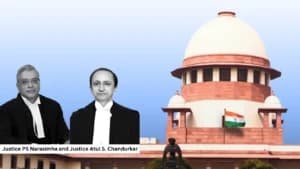The Karnataka High Court has ruled that Google India Private Limited cannot be held responsible for allegedly defamatory content shared on platforms such as Google LLC or YouTube, reaffirming that these are separate legal entities.
This observation was made by Justice Vijaykumar A. Patil, who allowed Google India’s writ petition that challenged its inclusion in a defamation suit (O.S. No. 6216/2017) pending before the LXIV Additional City Civil and Sessions Judge, Bengaluru.
The defamation case, originally filed in 2017, sought a permanent injunction to restrain 21 entities, including Google India, from allegedly posting defamatory statements, videos, or images affecting the plaintiff’s reputation across websites, news platforms, and channels.
Read also:- Bombay High Court Slaps ₹30 Lakh Costs on Litigants, Lawyers in Slum Redevelopment Case
"In the absence of any such specific pleading, the suit for permanent injunction against the petitioner cannot be proceeded with,"
— Karnataka High Court
No Direct Role by Google India in Content Posting
Google India, designated as Defendant No. 6, had earlier filed a written statement denying all claims and filed IA No. 4 under Order I Rule 10(2) of CPC, seeking its removal from the case. The company asserted that:
- It had not posted or broadcasted any defamatory material.
- It is not the owner of Google or YouTube.
- It is a separate entity incorporated under the Indian Companies Act, 1956.
- It only functions as a non-exclusive reseller of online advertising space under the AdWords program provided by Google LLC.
Read also:- J&K High Court Admits Plea Challenging 70% Reservation Under J&K Reservation Act, 2004
The trial court had initially rejected Google India’s plea to be removed from the suit. However, upon detailed hearing, the High Court found that the plaint did not provide any specific allegations or defamatory content directly linked to Google India.
Supreme Court and Bombay HC Precedents Cited
The High Court relied on the Supreme Court's ruling in M.J. Zakharia Sait v. T.M. Mohammed, which emphasized the necessity of precise pleading in defamation suits. The Court stated that a plaint must clearly spell out the who, what, and where of the alleged defamatory content.
Google India also drew support from a Bombay High Court decision in the case of Goldmines Telefilms v. Sai Entertainment, which found it inappropriate to involve Google India in a copyright infringement case based solely on YouTube uploads by unrelated parties.
Read also:- Property Disputes Beyond Scope of Senior Citizen Tribunals: Allahabad HC Reinforces Civil Court Jurisdiction
Google LLC, YouTube, and Google India Are Distinct
The Court examined the Google Terms of Service presented by the petitioner and concluded:
“Google India is a distinct legal entity… if any posting, broadcasting, web-hosting was done by Google LLC or YouTube, the petitioner cannot be sued.”
This reinforced the petitioner’s claim that it could not be liable for acts allegedly committed by other entities. The Court also referred to several other civil cases where Google India was removed from similar suits, including:
- Sanjana Archana Galrani v. Asianet Suvarna
- Divya Urduga M v. PBWAK
- Sreeleela v. Times of India
- Rangappa T v. Power TV
Read also:- Foreign Company Liable for Tax in India Even Without Exclusive Office: Supreme Court
Court’s Final Decision
After reviewing the records and hearing arguments, the Karnataka High Court issued the following order:
Allowed the writ petition
Set aside the February 2019 order of the trial court
Permitted the deletion of Google India (Defendant No. 6) from the defamation suit
Clarified no cost order
Case title - Google India Pvt. Ltd vs Nayana Krishna















